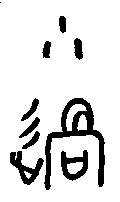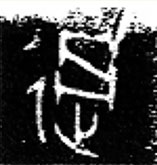I Ching, Yijing or Zhou Yi
"Oracle of the moon": © 2000 LiSe
 Yi Jing, Oracle of the Moon
Yi Jing, Oracle of the Moon

The image of hexagram 62
Xiăo Guò, small exceeding
What does it mean, 'inner' and 'outer trigram' (popup)
Gèn below Zhèn: when one's way of living has only its own true reality as base, it is honest and true to itself. One's conscience will be at rest and others can rely on you. Both you and others know where you stand. But... it is also the ability to pull a poker face, to have your own thoughts and actions, but for others they seem behind a wall.

Ideogram of the hexagram name: the first character, Xiăo, is three grains of rice or sand: small. The second character, Guò, is at right a skeleton above a mouth: distorted mouth or cleft palate, at left a foot with a footprint: stop or stay. Guò is the completion of an action, or that an action has taken place, but does not continue up to the present, like one wrong word which caused a war. Pass, go by, exceed, cross, transfer (e.g., ownership), undergo a process, surpass, exceed, celebrate, observe, fault, mistake, excessively, undue, overly. A very common use is for smaller violations in school or military.

There is an old bronze character which looks a lot like a winding road up to a mountain. Crossing a pass (cleft) in the mountains.
The 'Great Image' says: Above mountain is thunder, small exceeding. The noble one exceeds in respect in actions, exceeds in sorrow at funerals, exceeds in thrift at spending.
Hex.62 is the contrast of 61, where one's nature expresses itself as it is. Hex.62 is paying care to one's actions.
Hex.62 is the 'inverse' of itself.
The things you do are usually irreversible. So be careful. Especially in small matters, because in big things one is more aware of the risks and effects.
Death is definitive, and also all the feelings involved, so give extra attention to the the small things that happen, and the feelings of everyone. The same with spending money, so be thrifty and careful. The impression one makes on others is also irreversible, so pay attention to behavior and aura.
When misfortune hits, then meet it with respect.

